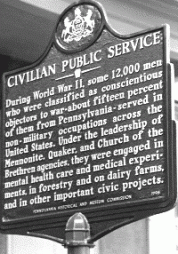The Objectors of World War II
Questionnaire Developed
- Wanted to find COs ahead of time to avoid conflicts in military
- Checked off it they opposed war or not
- Then, sheet sent with questions about beliefs
Civilian Public Service Formed
- Objectors could do work of "national importance" COMPROMISE
- Barely recognized by government, had to fund themselves CONFLICT
- Isolated
- Forest fire prevention, erosion and flood control, medical advances, mental institution improvements
1-W 1947COMPROMISE
- Objectors receieved wages
- Same activities
- More government support
In-legit COs
- People pretended to be COs to avoid war
- Hearings held if someone was suspected of being a "fake"
TYPICAL QUESTIONS AT HEARINGS
In general: How and when did you decide against the military service? Why can't you arrange military service with your conscience? What prohibits you from serving in the military?
Military service: Do you fear having to fight, or to use force? Do you want to abolish the army? What do you think about the phrase "We have the army to defend us, not to kill others?"
Use of force: What would you do if you were attacked? What do you feel when you see that others are attacked? What is violence, exactly? Would you rather experience losses than having to use force?
Belief: What does your belief say? Would you describe yourself as a pacifist? What basic values, besides objecting to violence, do you have? What entity gives you the certainty that your thinking and your feelings are right?
Implementation of your beliefs: Why didn't you choose to go into prison if your conscience is that strong? Why didn't you use medical reasons to avoid military service? What do you actually do to further peace, or is your attitude the only peaceful thing about you?
Personality: Who is in charge of defending your children in case of an armed conflict? Do you live your ethical principles inside your family? What books do you read? What do you demand from yourself? Are you merely a leader, a follower or a loner?

